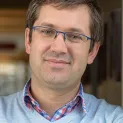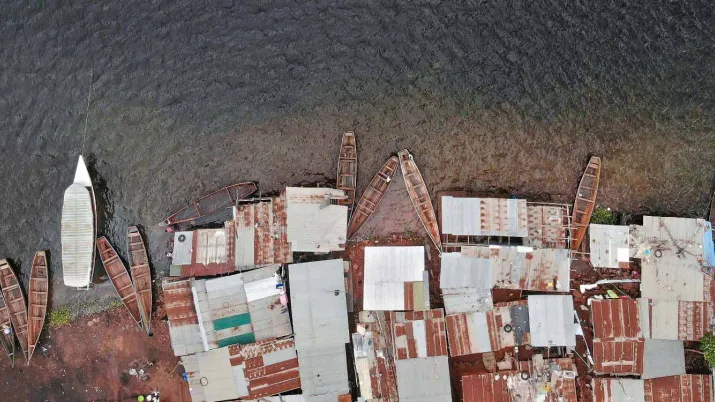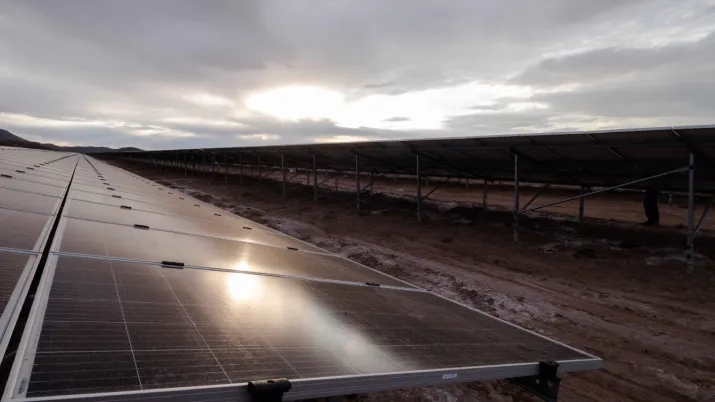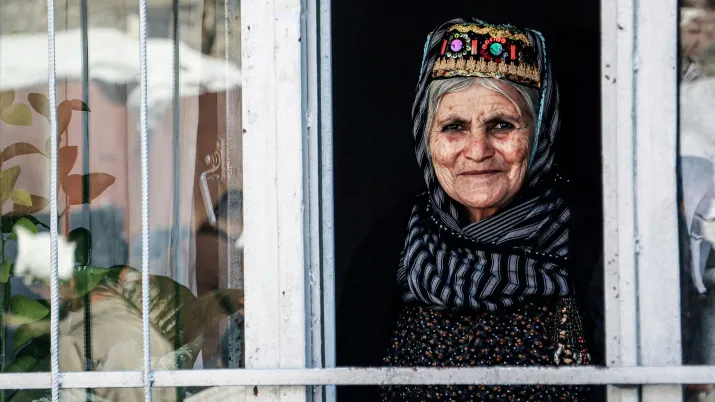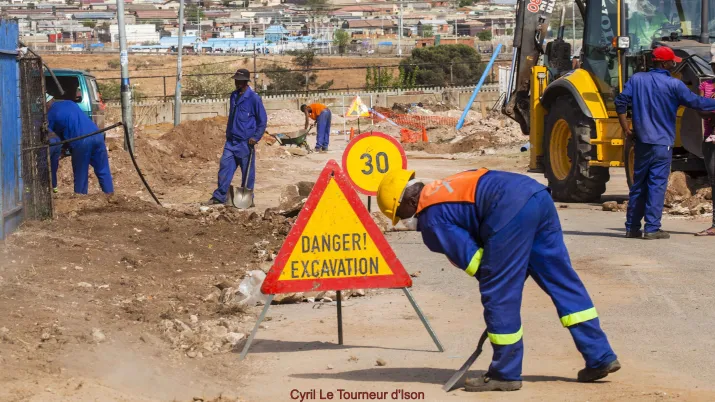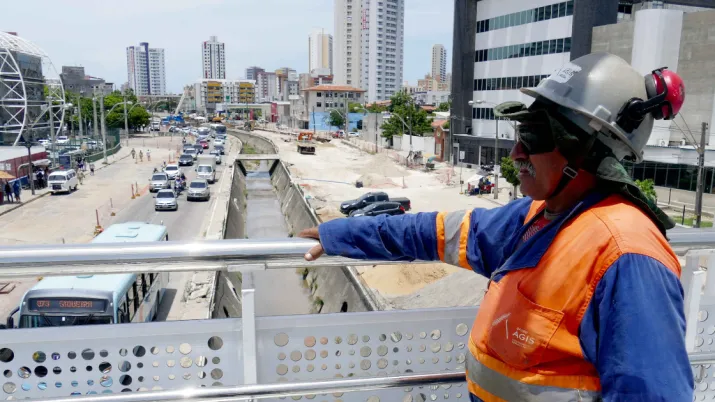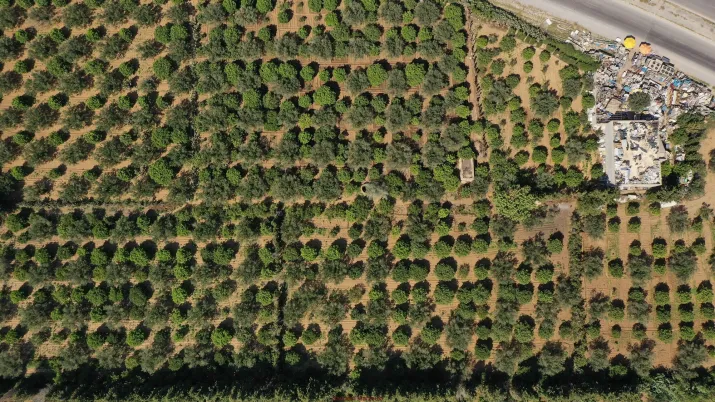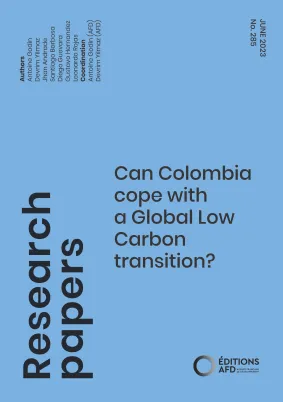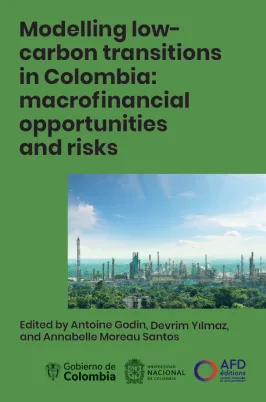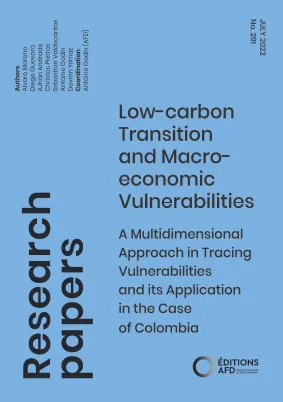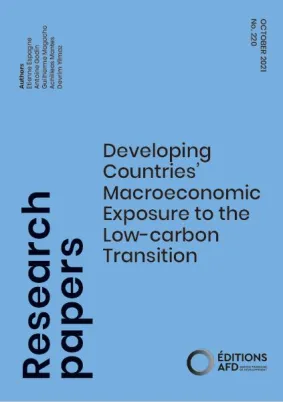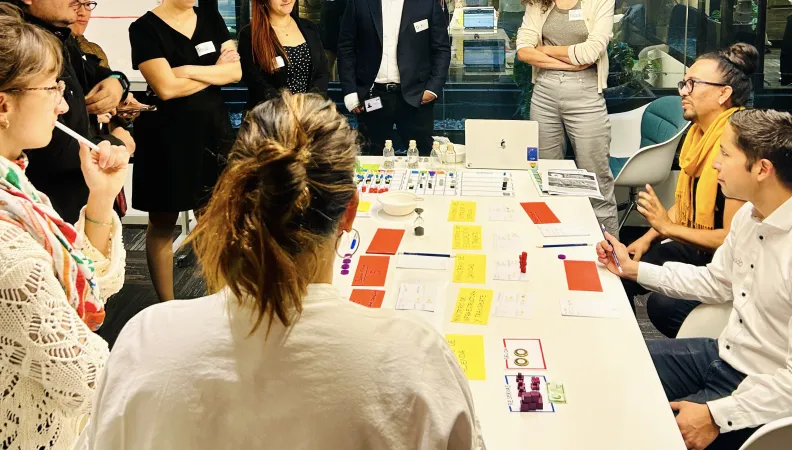 How can we better understand the behavior of the various stakeholders involved in Colombia's low-carbon transition? This project seeks to facilitate and promote high-level strategic dialogue around Colombia's energy transition through the design of a participatory process and the development of an interactive tool. Specifically, it aims to enable the exploration of different scenarios and support informed decision-making.
How can we better understand the behavior of the various stakeholders involved in Colombia's low-carbon transition? This project seeks to facilitate and promote high-level strategic dialogue around Colombia's energy transition through the design of a participatory process and the development of an interactive tool. Specifically, it aims to enable the exploration of different scenarios and support informed decision-making.
Context
Colombia, a country heavily reliant on fossil fuel exports, is actively working to complete its low-carbon transition and achieve its Nationally Determined Contribution (NDC) targets under the Paris Climate Agreement.
To support these efforts, Agence Française de Développement (AFD) has partnered with Colombian authorities to adapt the GEMMES macroeconomic model to Colombia's specific context. The objective was to assess the long-term macroeconomic vulnerabilities and opportunities linked to Colombia's energy transition within the broader global shift to low-carbon economies.
This research work has culminated in a collaborative publication, which outlines the scientific findings and public policy recommendations derived from the GEMMES Colombia project: Modelling low-carbon transitions in Colombia: Macrofinancial risks and opportunities
While macroeconomic modelling is crucial for understanding the impacts of policy decisions and addressing macroeconomic imbalances during transitions, it is equally important to consider the behavioral aspects that shape the decision-making processes and strategies of stakeholders involved in Colombia’s low-carbon transition.
About GEMMES: AFD and Macroeconomic Modelling Tools for the Ecological Transition
Goal
Building on the empirical findings from the GEMMES model scenarios, this project focuses on developing a strategy game to collectively explore future scenarios. Beyond the economic and financial dimensions, this tool also incorporates social, climatic, and—albeit to a lesser extent—biodiversity-related aspects, providing a more holistic approach to the energy transition.
The primary objective of this participatory modelling process is to foster dialogue among the key stakeholders in Colombia's transition, including ministries, the central bank, entrepreneurs, and researchers. By doing so, it aims to help them anticipate and prepare for the short-, medium-, and long-term macroeconomic impacts that the low-carbon transition may bring.
To achieve this, the Powershift strategy game aims to:
- Familiarize stakeholders involved in the transition with the macroeconomic challenges associated with it, enabling them to take ownership of these issues.
- Identify the "mental maps" of each category of stakeholder regarding the energy transition, thereby shedding light on the tensions and synergies that arise and supporting the evolution of these mental models.
In doing so, the project seeks to strengthen high-level interministerial and intersectoral dialogue, ultimately improving coordination among stakeholders—including the private sector—in support of Colombia's environmental commitments.
Download the project presentation leaflet (in Spanish)
Method
The design, modeling, and implementation of the strategy game are grounded in the ComMod methodology, initially developed by CIRAD to facilitate multi-stakeholder processes and support collective decision-making and action.
The process includes modelling workshops with stakeholders, crash-test sessions, and game workshops with decision-makers. Key stages involve conceptualization, validation, and scenario exploration. An ex-ante and ex-post evaluation of stakeholder positions will be conducted to measure the impact of the initiative.
To ensure the effective integration of findings into public policies, feedback workshops will be organized with policymakers.
Results
The project has led to the creation of a validated strategy game, which is now being used by Colombian counterparts to explore energy transition scenarios. To date, six crash-test and game sessions have been conducted, engaging around fifty public and private stakeholders in the energy transition and involving more than twenty institutions. These include Colombian universities, ministries (Finance, Environment, Labour, Planning), the central bank, research centers, international cooperation agencies, NGOs, business associations, and consultancies.
Future outputs will include workshop summary reports, a research paper, policy recommendations, and mediation materials. The lessons learned will be shared with Colombian partners through dedicated feedback workshops.
Find out more:
Lessons learned
Feedback from participants in the sessions highlights an improved understanding of the effects of the energy transition on the real economy of a country heavily reliant on hydrocarbon exports, as well as increased awareness of the associated challenges.
The main feedback points were as follows:
- Creation of an educational space conducive to dialogue: The sessions fostered connections with stakeholders who had not previously been in contact, facilitating new opportunities for collaboration.
- Flexibility and adaptability: The tool proved its ability to adapt to diverse audiences, making it a valuable resource for engaging a wide range of participants.
- Awareness of complex dynamics: Participants gained deeper insight into the intricate dynamics of the energy transition and the crucial role of research in this field.
- Highlighting behavioral dynamics: The sessions revealed that organized collective action often arises in response to emergencies or shared challenges.
- Challenge of a holistic vision: Developing a comprehensive understanding of the energy transition and stakeholder strategies was noted as particularly difficult due to the subject's complexity.
Future sessions will expand to include parliamentarians and deputy ministers, broadening the dialogue to higher levels of decision-making.
Contacts
- Annabelle Moreau Santos, Scientific Mediation Officer, AFD
- Antoine Godin, Economist, Head of AFD Macroeconomic Modelling Team
- Audrey Perraud, Research Officer, AFD
- Julien Calas, Agronomist and Research Officer on Biodiversity, AFD
Discover other research projects
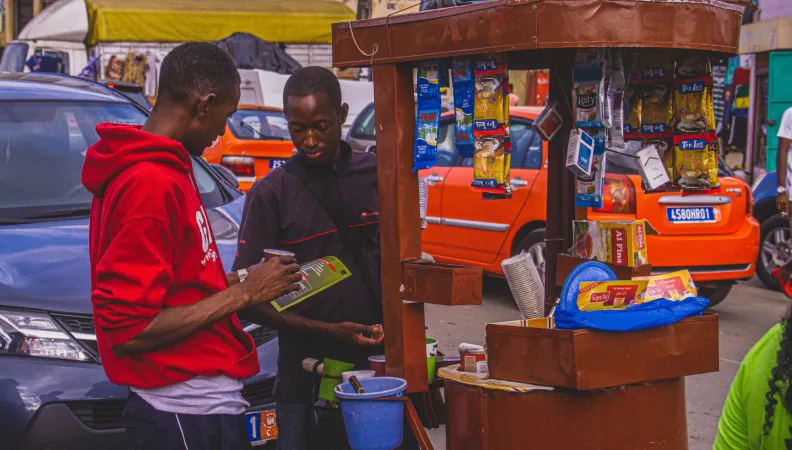 The integration of young people into the labour market is a challenge for Côte d'Ivoire, in a context of strong population growth. AFD is working with the Centre de recherche microéconomique du développement (CREMIDE) of Université Felix Houphouët-Boigny in Abidjan to conduct a skills assessment in four secondary cities in the country, and examine their adequacy with local job offers. The objective is to formulate recommendations regarding the integration of young people into the labour market and increase the attractiveness of these cities.
The integration of young people into the labour market is a challenge for Côte d'Ivoire, in a context of strong population growth. AFD is working with the Centre de recherche microéconomique du développement (CREMIDE) of Université Felix Houphouët-Boigny in Abidjan to conduct a skills assessment in four secondary cities in the country, and examine their adequacy with local job offers. The objective is to formulate recommendations regarding the integration of young people into the labour market and increase the attractiveness of these cities.
Context
The economic upturn in Côte d'Ivoire since the 2010s has had a limited impact on employment. The transition to employment is often difficult: 35% of 16-35 year olds are far from the labour market (neither employees, nor educated or in training). Moreover, the share of informal employment remains very high (89.4% in 2019). In this context, as a result of population growth, 300,000 young graduates join the job market every year – and an equivalent number leave the education system without a diploma, and without prospects. The mismatch between skills and job offers would be one of the explanations for the difficulties of integrating young people into the labour market.
If these young people carry economic and social development opportunities, they also carry risks if their potential is not used. Population growth makes it imperative to understand changes in labour supply and demand in order to adapt the education and learning system to the needs of the local labour market.
Goal
This research project aims to analyze the supply and demand of skills in Bouaké, Daloa, San-Pedro and Korhogo, four secondary cities in Côte d'Ivoire with strong economic potential but that is still little exploited. The city of Abidjan, on which the majority of studies on Côte d'Ivoire focus, is not specifically addressed by this research, but it remains the "reference" case for the analysis of the situations of secondary cities.
Deepening the results of a previous research project on the mismatch between skills and jobs in Côte d'Ivoire, this research project aims to enrich national knowledge on the functioning of the labour market and the nature of bottlenecks that make the transition to employment difficult for young people, as well as to make recommendations aimed at promoting employment and the attractiveness of the four cities.
Additionally, the project includes capacity-building activities specifically targeting young CREMIDE researchers, to support them in the development of their research and to encourage the establishment of scientific partnerships through their participation in international conferences, workshops and training seminars, and through residence in specialized research centres.
Method
The study will include an in-depth examination of the structure and composition (demography, training and skills) of the local workforce, and of spatial inequalities in skills supply and demand. A gender-specific assessment of the local skills supply will also be carried out, as well as a prospective analysis of the impact of technological developments on the labour market in these cities.
The data used will come from both employment surveys available since 1993 and field surveys conducted during this project. The analysis will incorporate a prospective aspect aimed at understanding jobs in Côte d'Ivoire by 2025 and 2030.
Knowledge will be shared with the research community and made available to national and local decision-makers through workshops, conferences and publications in adapted formats to inform public decision-making.
Discover other research projects
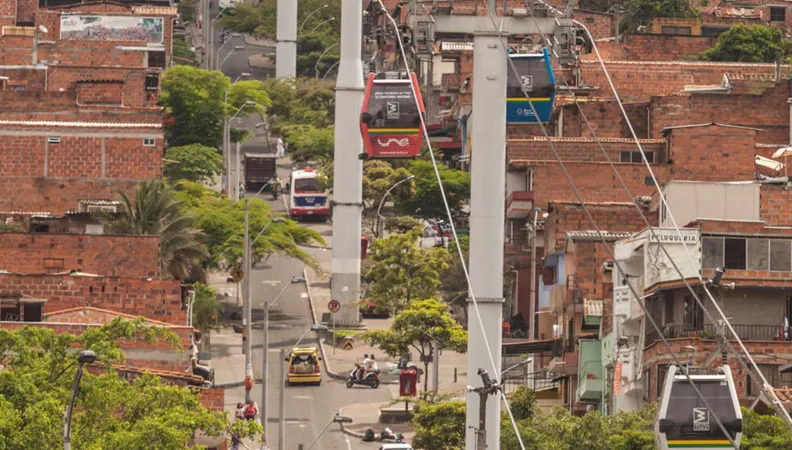 Colombia has demonstrated its commitment to climate issues through its commitment to implementing its nationally determined contribution (NDC) under the Paris Agreement. Developing an ecologically and economically sustainable development trajectory is a significant challenge, which the GEMMES Colombia project supports through sound methodology and policy-based dialogue.
Colombia has demonstrated its commitment to climate issues through its commitment to implementing its nationally determined contribution (NDC) under the Paris Agreement. Developing an ecologically and economically sustainable development trajectory is a significant challenge, which the GEMMES Colombia project supports through sound methodology and policy-based dialogue.
Context
Highly exposed to the effects of climate change and to the degradation of natural resources, Colombia is strengthening its climate policy, considering a green growth strategy, particularly since the 2014-2018 National Development Plan. Nevertheless, the country's dependence on raw material exports and its strong integration into international financial markets generate monetary, financial and commercial vulnerabilities.
AFD is supporting Colombia in its efforts to tackle climate change through the GEMMES Colombia project, which is part of the third climate policy loan since 2018. The GEMMES programme, by integrating the impact of climate change into its forecasts, is developing a general theoretical model on the one hand, and national models applied to concrete cases and adapted to the characteristics of each country on the other, including the GEMMES Colombia model.
Objectives
The GEMMES Colombia project, which is fully in line with AFD's commitment to strong sustainability, aims to :
- Highlight potential fragilities in the Colombian economy through a better understanding of the interactions between fiscal, monetary and trade policies and the country's NDC objectives;
- Identify the opportunities generated by the energy transition in Colombia: structural changes and financing methods under the best possible conditions;
- Quantifying the macroeconomic impact of NDC-related investments, particularly in the financial and tax sectors;
- Promoting public policy dialogue on Colombia's energy transition:
- Providing a decision-making tool for decision-makers on climate policies, with a view to limiting the consequences identified without compromising the implementation of Colombia's NDC objectives;
- By promoting the appropriation and sustainability of the GEMMES modelling tool within the partner institutions.
Method
In addition to its specific transdisciplinary approach, which makes this project one of the few to integrate the notion of strong sustainability, the originality of GEMMES lies in its consideration of macro-financial imbalances and the impact of the low-carbon transition on all elements of the balance of payments.
Moreover, GEMMES Colombia is part of a partnership initiative that is organised around two phases:
- The first phase is based on the development of the model and the macroeconomic analysis of the Colombian NDC trajectory, in partnership with the National Planning Department (DNP) and the Ministry of Finance (MHCP) supported by AFD's modelling teams.
- The second is intended to ensure the sustainability of the project after the end of the support, with the analysis by the National University of Bogota (UNAL) of the interactions between trade, fiscal and monetary policies and the NDC trajectory, as well as the training of students in sustainable development through the Catedra course as well as in the GEMMES methodological approach.
Results
The GEMMES Colombia model, enriched by academic expertise and integrated into decision-making processes through Colombian ministries, has become a key tool for public policy dialogue on the energy transition:
- At the request of the Colombian authorities, GEMMES was added to the MHCP’s macroeconomic models in 2023 and was coupled with the Energyscope energy model, a tool for energy assessment and planning. The model’s adoption continued in 2024 with an executive training session on its use provided to MHCP officials.
- These exchanges are ongoing through the GEMMES Strategic Committee, composed of the Ministry of Finance and Public Credit (MHCP), the National Planning Department (DNP), the Ministry of Mines and Energy (MME), and the Banco de la República.
FIND OUT MORE
Furthermore, the research work led to the publication of a collective volume launched in June 2024, presenting the scientific findings and policy recommendations derived from the project: Modelling Low-Carbon Transitions in Colombia: Macrofinancial Opportunities and Risks
This work also gave rise to a new initiative: the creation of PowerShift, a strategy game designed to support multi-stakeholder dialogue around Colombia’s NDC.
Watch the replay of the GEMMES Colombia book launch (in Spanish)
The first results of the project had been presented at the virtual congress "Conexión DNP: transfiriendo conocimiento para innovar" on 2 and 3 December 2021. The project partners expressed their satisfaction, with the MHCP showing a particular interest in modelling after a year of remote work due to the Covid-19 pandemic.
In March 2022, a university course on sustainable development (Catedra), partly based on the results of the GEMMES Colombia project, was launched at UNAL. As a continuation of this initiative, a second course on the modelling of ecological transitions in the Global South was given in 2023.
Research findings
The GEMMES Colombia model, by developing scenarios on fossil fuel exports and alternative policies for the 2023-2050 period, as well as financing scenarios of the NDC trajectory, contributes to informing decision-makers in their political strategy to fight global warming. The model also allowed the National Planning Department (DNP) to analyze the consequences of economic shocks such as the loss of the country’s investment quality, the reduction of coal exports or the bankruptcy of Evergrande in China.
The conclusion is clear: a diversification of the production structure and a transformation of public finances are essential if Colombia is to meet the challenges of a global low-carbon transition and ensure its own energy transition. The GEMMES model highlights the importance of using a combination of private investment and public green bonds to finance Colombia's climate ambition.
Download the publications related to GEMMES Colombia
Contact
-
Antoine GODIN
Economist - Modeler
